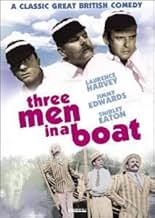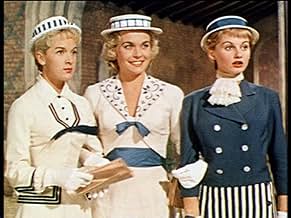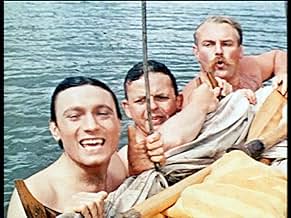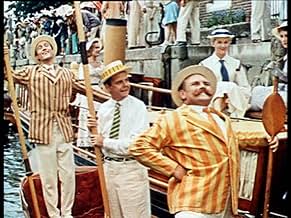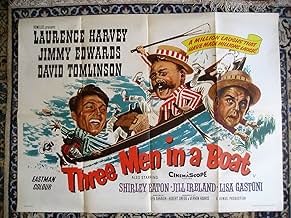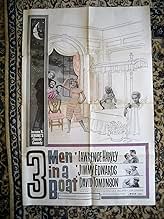AVALIAÇÃO DA IMDb
5,3/10
470
SUA AVALIAÇÃO
Adicionar um enredo no seu idiomaThree London gentlemen take a vacation rowing down the Thames, encountering various mishaps and misadventures along the way.Three London gentlemen take a vacation rowing down the Thames, encountering various mishaps and misadventures along the way.Three London gentlemen take a vacation rowing down the Thames, encountering various mishaps and misadventures along the way.
- Direção
- Roteiristas
- Artistas
- Indicado para 1 prêmio BAFTA
- 2 indicações no total
Avaliações em destaque
When I saw this film advertised on Talking Pictures, I just had to watch it. I think I saw it as a child many years ago; but in the meantime I had read the book and wanted to compare the interpretation.
To be honest, I didn't find the book that funny despite the opinion of many critics down the years. I had an interest because I'm from Walsall, Jerome K Jerome's home town (didn't his parents have any imagination!). Anyhow, as mentioned elsewhere, the film has little in common with the book. Some of the scenarios used e.g. the picnic, are related as happening to acquaintances rather than the main characters themselves. Having said that, the tin of pineapples scene was pretty faithfully rendered.
So far as casting goes, I think they got it about right. I had no problems with Laurence Harvey as George, and thought he was an effective counter to David Tomlinson's bumbling and Jimmy Edward's bull-in-a-china shop approach. Although the slapstick episodes did become tedious.The females were of course window dressing. Jill Ireland played her vacant self, and Shirley Eaton was a bit too modern for the era. Particularly in the bath scene! Strangely, Lisa Gastoni was the only one who convinced (what happened to her?) Martita Hunt, never a beauty, but always a beautiful performance, gave us her usual character; the matriarch. And I wonder if she was ever in anything other than period costume dramas?
The Hampton Court Maze scene was the best, with a host of British character actors running around wildly trying to get out. In all it wasn't a bad movie. Like the book, it sought to convey a picture of an idyllic England, long-since vanished. Although in reality, such a vision only ever existed for the privileged few. A true representation of the book would be difficult to reproduce, and probably wouldn't be half as interesting. Coincidentally, when I worked at a college some years ago, three students retraced the journey down the Thames in a boat one summer vac. Like in the film, it apparently rained a lot!
It was when I saw a 2006 documentary about three friends taking a boat trip on the Thames River to emulate Jerome K. Jerome's story of Three Men in a Boat, that I realized I'd never seen this movie. I recalled hearing about it from my youth but simply never had the opportunity until recently when I got a DVD from my library.
Now, I've not read the actual book but, I understand from other reviews I've read elsewhere, the film narrative bears little relationship to the story that Jerome penned one reviewer even going so far to say that the author would be turning in his grave. No doubt stories from other authors have fared the same or worse.
So, if you have read the story then you may be disappointed. However, as an example of well-produced British humour from the 1950s, it stands the test of time as a light-hearted, albeit cliché-ridden, romp with Jimmy Edwards as Harris, Laurence Harvey as George and the very dapper David Tomlinson as J the surrogate Jerome. For the love interest encountered along the way, the three men meet up with Shirley Eaton as Sophie, Lisa Gastoni as Primose and Jill Ireland as Bluebell.
The story is filmed, essentially, as a series of set pieces, beginning with the Preparations to Take a Trip during which the three are shown for the bumbling idiots they are with a hilarious, but predictable, catastrophic attempts to package up all their supplies, all ending in shambles at the bottom of stairs, with a similar situation as they load it onto the boat, almost capsizing.
However, off they row, and their first port of call is Hampden Court where they decide to experience the Largest Maze in Europe (or so we're told) and, naturally, they get confused and confuse everyone else in the maze with their efforts to lead them out which, naturally, leads to more slapstick humour.
Later that evening, there is Making Camp for the Night, which, being England, is wet, very wet and an occasion for more misery for the trio, and much hilarity for the viewer as they go through all of the mistakes that many people make when erecting tents, building fires, and so forth. During the course of that day, however, they meet up with the three young women and begin the flirtations.
The next day could be captioned the Photo Op whereby, coming upon a large boating fraternity all waiting to get through a lock, and with a local photographer on hand, our intrepid three make further advances towards the women but simply end up on their bums, legs in the air, and their boat in danger of being swamped. Only the quick action of Bluebell saves them by using a boat hook to prevent disaster, thereby enhancing the budding relationships. The three men, however, are caught on camera, much to their chagrin.
In succession, then, there is the Evening Dance, followed by the funniest attempts I've seen to Open a Can of Pineapple at their camp and which has almost the same level of madcap humour as that greatest of all when Basil Fawlty (John Cleese of TV's Fawlty Towers) beats up his Austin car, with a tree branch, for refusing to start. If you've seen that, you know what I mean. Now I wonder if Cleese was influenced by the can of pineapple that wouldn't open?
The next morning, they Take a Dip in the river but skinny-dipping. All goes well, sort of, until a group of women and children decide to have a picnic nearby. Ah, watch how they finally get back on board their boat while retaining modesty. Priceless...
After that, the three manage to Ruin a Racing Eights Race when they cross the river in their boat to reach the women on the other bank; numerous eights are left in shambles with entangled oars, the three blissfully unaware of their transgression. And, the film ends with the old standby: The Cricket Match (only in England, of course) where the three reduce that to chaos, totally, with the help of J's pet dog. I nearly fell off my chair.
Sure, it's a total farce, but that's what the Brits are good at well, in those times, anyway. The acting is top-notch, as you would expect, although I think Laurence Harvey, to be kind, was more suited to dark dramas like Room at the Top (1959), A walk on the wild side (1962), A dandy in aspic (1968) and so on. Comedy seemed a bit of a strain for him. Not so Tomlinson and Edwards, of course.
The script is very funny also, alive with cracking good one-liners, double entendre and heavy irony. The Eastman colour is vibrant, to put it mildly, but it does enhance the scenery and the idyllic settings. The women act well, although they don't share the same amount of screen time as the men. Jill Ireland, of course, went on to appear in Robbery Under Arms (1957) and met her future husband, Charles Bronson, in the process. The film was directed by Ken Annakin, who went on to direct Nor the Moon by Night (1958), Third man on the mountain (1959), co-director on The Longest Day (1962), and followed that by directing The Battle of the Bulge (1965) and others.
Three Men is suitable for all ages, and good for family viewing. Recommended for those who like English humour of the fifties and sixties.
Now, I've not read the actual book but, I understand from other reviews I've read elsewhere, the film narrative bears little relationship to the story that Jerome penned one reviewer even going so far to say that the author would be turning in his grave. No doubt stories from other authors have fared the same or worse.
So, if you have read the story then you may be disappointed. However, as an example of well-produced British humour from the 1950s, it stands the test of time as a light-hearted, albeit cliché-ridden, romp with Jimmy Edwards as Harris, Laurence Harvey as George and the very dapper David Tomlinson as J the surrogate Jerome. For the love interest encountered along the way, the three men meet up with Shirley Eaton as Sophie, Lisa Gastoni as Primose and Jill Ireland as Bluebell.
The story is filmed, essentially, as a series of set pieces, beginning with the Preparations to Take a Trip during which the three are shown for the bumbling idiots they are with a hilarious, but predictable, catastrophic attempts to package up all their supplies, all ending in shambles at the bottom of stairs, with a similar situation as they load it onto the boat, almost capsizing.
However, off they row, and their first port of call is Hampden Court where they decide to experience the Largest Maze in Europe (or so we're told) and, naturally, they get confused and confuse everyone else in the maze with their efforts to lead them out which, naturally, leads to more slapstick humour.
Later that evening, there is Making Camp for the Night, which, being England, is wet, very wet and an occasion for more misery for the trio, and much hilarity for the viewer as they go through all of the mistakes that many people make when erecting tents, building fires, and so forth. During the course of that day, however, they meet up with the three young women and begin the flirtations.
The next day could be captioned the Photo Op whereby, coming upon a large boating fraternity all waiting to get through a lock, and with a local photographer on hand, our intrepid three make further advances towards the women but simply end up on their bums, legs in the air, and their boat in danger of being swamped. Only the quick action of Bluebell saves them by using a boat hook to prevent disaster, thereby enhancing the budding relationships. The three men, however, are caught on camera, much to their chagrin.
In succession, then, there is the Evening Dance, followed by the funniest attempts I've seen to Open a Can of Pineapple at their camp and which has almost the same level of madcap humour as that greatest of all when Basil Fawlty (John Cleese of TV's Fawlty Towers) beats up his Austin car, with a tree branch, for refusing to start. If you've seen that, you know what I mean. Now I wonder if Cleese was influenced by the can of pineapple that wouldn't open?
The next morning, they Take a Dip in the river but skinny-dipping. All goes well, sort of, until a group of women and children decide to have a picnic nearby. Ah, watch how they finally get back on board their boat while retaining modesty. Priceless...
After that, the three manage to Ruin a Racing Eights Race when they cross the river in their boat to reach the women on the other bank; numerous eights are left in shambles with entangled oars, the three blissfully unaware of their transgression. And, the film ends with the old standby: The Cricket Match (only in England, of course) where the three reduce that to chaos, totally, with the help of J's pet dog. I nearly fell off my chair.
Sure, it's a total farce, but that's what the Brits are good at well, in those times, anyway. The acting is top-notch, as you would expect, although I think Laurence Harvey, to be kind, was more suited to dark dramas like Room at the Top (1959), A walk on the wild side (1962), A dandy in aspic (1968) and so on. Comedy seemed a bit of a strain for him. Not so Tomlinson and Edwards, of course.
The script is very funny also, alive with cracking good one-liners, double entendre and heavy irony. The Eastman colour is vibrant, to put it mildly, but it does enhance the scenery and the idyllic settings. The women act well, although they don't share the same amount of screen time as the men. Jill Ireland, of course, went on to appear in Robbery Under Arms (1957) and met her future husband, Charles Bronson, in the process. The film was directed by Ken Annakin, who went on to direct Nor the Moon by Night (1958), Third man on the mountain (1959), co-director on The Longest Day (1962), and followed that by directing The Battle of the Bulge (1965) and others.
Three Men is suitable for all ages, and good for family viewing. Recommended for those who like English humour of the fifties and sixties.
I read the reviews of Three Men in a Boat before watching the film and couldn't believe that it is as bad as most reviewers claim. I mean to say, just look at the cast. Tomlinson, Edwards and Harvey are not a collection of comedic geniuses, perhaps, but surely they amass enough talent to produce an amusing adaptation of this admired novel. However, the negative reviewers are correct: this film is simply terrible. Although it only runs to 84 minutes it took me five sittings to get through it. I could barely tolerate watching twenty minutes at a time. I persevered because
well, look at the cast, surely they would deliver something funny eventually; perhaps the finale would be hilarious.
I grew up in Britain and still love old British comedies: Ealing, of course, Will Hay, Alastaire Sim, Peter Sellers, and so many others. I even like the lower-level comedy of the Carry On series, Benny Hill, or Frankie Howerd. This film, though, has less laughs than Polanski's Macbeth.
Some reviews have suggested that some people find the film unamusing because it is 'dated.' It was made in the fifties and set in the 1880s. However, these facts alone shouldn't be detrimental to a film's appeal. A good number of Britain's best and most appreciated comedies were made in the fifties, such as The Lavender Hill Mob, Hobson's Choice, and I'm All Right Jack. In fact, the decade is a Golden Age for British film comedy. The story's setting in an earlier period can hardly be detrimental either. Kind Hearts and Coronets stands easily as one of the best British comedies, yet it was set in the same historical period as Three Men in a Boat, was released six years earlier and was filmed in black and white. Similarly, Ken Annakin, this film's director, had his biggest successes with Monte Carlo or Bust! (1969) and Those Magnificent Men in Their Flying Machines (1965), both of which are set in times only slightly later than Three Men in a Boat and are equally far removed from contemporary audiences, but are still relatively amusing.
Some films age badly because of the focus of the material. George Formby and the Old Mother Riley comedies relied for their context on a particular interwar period and a British working class culture that had largely disappeared by the 1960s and has little meaning for people in contemporary Britain, let alone the rest of the world. Other examples are the sex comedies made in Britain in the 1970s or the blacksploitation movies made in the US in the same decade. These films are clearly dated but retain entertainment value because of their anachronistic fashions and dialogue.
Astonishingly, Three Men in a Boat was nominated for a BAFTA for, of all things, best screen play. This is baffling because the writers make little effort to drive the story with witty dialogue. Dialogue is, in fact, rather scant. The attempts at comedy come mostly from slapstick situations where our heroes wave tent poles and oars around for insufferable lengths of time, fall in the water repeatedly, and prattles on loudly and unintelligibly. The assumption is, apparently, that if these situations continue for long enough something funny simply has to happen. It doesn't. Slapstick can be badly done but it doesn't become dated. The silent movies of Chaplain and Keaton are still wonderful; the Three Stooges are still ridiculous and funny; much in Norman Wisdom's movies is dated, but when he falls through a window he is still hilarious. Not so Tomlinson, Edwards and Harvey.
On this one, I'm afraid, I concur with the "smug" negative reviewers. This is the least funny Brit Com I've ever seen, and I've seen "Carry on England."
I grew up in Britain and still love old British comedies: Ealing, of course, Will Hay, Alastaire Sim, Peter Sellers, and so many others. I even like the lower-level comedy of the Carry On series, Benny Hill, or Frankie Howerd. This film, though, has less laughs than Polanski's Macbeth.
Some reviews have suggested that some people find the film unamusing because it is 'dated.' It was made in the fifties and set in the 1880s. However, these facts alone shouldn't be detrimental to a film's appeal. A good number of Britain's best and most appreciated comedies were made in the fifties, such as The Lavender Hill Mob, Hobson's Choice, and I'm All Right Jack. In fact, the decade is a Golden Age for British film comedy. The story's setting in an earlier period can hardly be detrimental either. Kind Hearts and Coronets stands easily as one of the best British comedies, yet it was set in the same historical period as Three Men in a Boat, was released six years earlier and was filmed in black and white. Similarly, Ken Annakin, this film's director, had his biggest successes with Monte Carlo or Bust! (1969) and Those Magnificent Men in Their Flying Machines (1965), both of which are set in times only slightly later than Three Men in a Boat and are equally far removed from contemporary audiences, but are still relatively amusing.
Some films age badly because of the focus of the material. George Formby and the Old Mother Riley comedies relied for their context on a particular interwar period and a British working class culture that had largely disappeared by the 1960s and has little meaning for people in contemporary Britain, let alone the rest of the world. Other examples are the sex comedies made in Britain in the 1970s or the blacksploitation movies made in the US in the same decade. These films are clearly dated but retain entertainment value because of their anachronistic fashions and dialogue.
Astonishingly, Three Men in a Boat was nominated for a BAFTA for, of all things, best screen play. This is baffling because the writers make little effort to drive the story with witty dialogue. Dialogue is, in fact, rather scant. The attempts at comedy come mostly from slapstick situations where our heroes wave tent poles and oars around for insufferable lengths of time, fall in the water repeatedly, and prattles on loudly and unintelligibly. The assumption is, apparently, that if these situations continue for long enough something funny simply has to happen. It doesn't. Slapstick can be badly done but it doesn't become dated. The silent movies of Chaplain and Keaton are still wonderful; the Three Stooges are still ridiculous and funny; much in Norman Wisdom's movies is dated, but when he falls through a window he is still hilarious. Not so Tomlinson, Edwards and Harvey.
On this one, I'm afraid, I concur with the "smug" negative reviewers. This is the least funny Brit Com I've ever seen, and I've seen "Carry on England."
The DVD for "Three Men in a Boat" has no captioning. So, if you are hard of hearing or have difficulty with the accents, then you are screwed.
The first thing I noticed about this film is the odd casting decision for the leads. While Jimmy Edwards and David Tomlinson seem like natural choices for a comedy, I cannot understand casting Laurence Harvey as the third lead. After all, he had all the comic flair of a mortician and he was simply too pretty to be believable as the friend of the two idiots, Tomlinson and Edwards. Perhaps this odd casting choice can be explained, just a bit, because Harvey still hadn't established much of a screen persona, as his best films were ahead of him.
The film is a very slight comedy involving three male friends who decide to spend their holiday punting down the Thames (for non-Brits, this is 'boating down river'). They are definitely roughing it--camping out and cooking in the great (and often wet) outdoors. Such a vacation seems completely miserable but the three have some adventures (and, now that I think about it, this is practically the same plot as "Deliverance").
What bothered me about this film (aside from the casting) was the obviousness of the comedy. This is not to be confused with a sparkling Ealing comedy, as pratfalls and occasionally silly sound effects are the norm for "Three Men in a Boat". Oddly, however, despite this, the film often was very, very mundane--a very strange combination to say the least. As a result, I found the film tedious and unfunny.
The first thing I noticed about this film is the odd casting decision for the leads. While Jimmy Edwards and David Tomlinson seem like natural choices for a comedy, I cannot understand casting Laurence Harvey as the third lead. After all, he had all the comic flair of a mortician and he was simply too pretty to be believable as the friend of the two idiots, Tomlinson and Edwards. Perhaps this odd casting choice can be explained, just a bit, because Harvey still hadn't established much of a screen persona, as his best films were ahead of him.
The film is a very slight comedy involving three male friends who decide to spend their holiday punting down the Thames (for non-Brits, this is 'boating down river'). They are definitely roughing it--camping out and cooking in the great (and often wet) outdoors. Such a vacation seems completely miserable but the three have some adventures (and, now that I think about it, this is practically the same plot as "Deliverance").
What bothered me about this film (aside from the casting) was the obviousness of the comedy. This is not to be confused with a sparkling Ealing comedy, as pratfalls and occasionally silly sound effects are the norm for "Three Men in a Boat". Oddly, however, despite this, the film often was very, very mundane--a very strange combination to say the least. As a result, I found the film tedious and unfunny.
The trouble with this film is it is very much of its time. It's hardly a film of the book, more an excuse to steal a few sparse ideas and try to string them together into a light-hearted comedy.
There's really far too much slapstick, and 1950's style girl-chasing, no real sense of a journey as there is in the book.
I wonder if anyone will ever make a proper adaption of the book, making proper use of JKJ's wonderful anecdotes? It would be tricky to do - they are often about completely different people from the three in the boat, but they are what make the book so good, and they've simply been discarded in the film.
So, in summary, if you've never read the book, you're in for a nice surprise: comedy that is still funny after a hundred years and more, but don't let this film put you off.
There's really far too much slapstick, and 1950's style girl-chasing, no real sense of a journey as there is in the book.
I wonder if anyone will ever make a proper adaption of the book, making proper use of JKJ's wonderful anecdotes? It would be tricky to do - they are often about completely different people from the three in the boat, but they are what make the book so good, and they've simply been discarded in the film.
So, in summary, if you've never read the book, you're in for a nice surprise: comedy that is still funny after a hundred years and more, but don't let this film put you off.
Você sabia?
- CuriosidadesA box office disappointment in its native England, the film was nevertheless enthusiastically received in France.
- Erros de gravaçãoAfter the picnic, the mud spatters from the dog on the girl's dress disappear in the medium shot.
- ConexõesVersion of Three Men in a Boat (1920)
Principais escolhas
Faça login para avaliar e ver a lista de recomendações personalizadas
- How long is Three Men in a Boat?Fornecido pela Alexa
Detalhes
- Tempo de duração1 hora 31 minutos
- Proporção
- 2.35 : 1
Contribua para esta página
Sugerir uma alteração ou adicionar conteúdo ausente

Principal brecha
By what name was Três Destinos e um Barco (1956) officially released in India in English?
Responda
